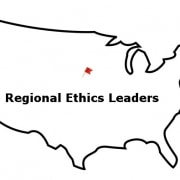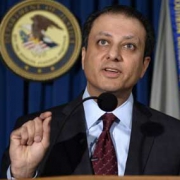Featured Collaborator for April: Jeffrey Kaplan
Interview with Jeffrey Kaplan, partner in the Kaplan & Walker LLP law firm in Princeton, New Jersey
 What are your main areas of research /writing?
What are your main areas of research /writing?
I am principally a practitioner – in the compliance and ethics (“C&E”) field – rather than a professional researcher, and I certainly have not conducted any experimental research. I have done survey research – for the Conference Board (on the role of corporate directors in promoting C&E and on shortfalls in US government enforcement policy vis a vis C&E) and for the Ethics & Compliance Initiative (the “ECI,” which used to be called the ECOA) on conflicts of interest and various C&E program practices. Also, for the past four years I have been assembling and analyzing cases and articles about conflicts of interest (“COIs”) for a blog which looks at various COI issues across varying industry contexts (e.g., what types of interests are cognizable for COI purposes or when should a waiver be permitted) I hope at some point to turn these posts into a book about all things COI-related.
Some of my other publishing falls into the category of “field notes”(loosely speaking), meaning that I write about things I’ve seen as a C&E practitioner that might be help corroborate others’ research and scholarship. For instance, as a defense lawyer in the late 1980s I became aware of a nationwide fraud (involving the sale of “specialty pipe”) which had been going on for decades and seemed to involve a very high percentage of industry participants. This helped me see that much of what drives individuals to do wrong or right is the situation they face – not their individual characters. In other words, the case showed that a central tenet of behavioral ethics works not only in theory but practice. And, given the multiple layers of commerce involved, the case also helped demonstrate the behavioral phenomenon of “victim distance” – meaning that it is easier to commit a crime when you don’t know who the victim is. The hope of finding more connections between the work of behavioral ethicists and that of C&E practitioners is part of what draws me to Ethical Systems.
What other topics do you focus on in your C&E writing?
Risk assessment has been an important area of focus for me for many years. My first article about risk assessment was published in 1992, when the C&E field was just getting started. More recently, various blog posts of mine on risk assessment for the Corporate Compliance Insights web site have been collected into an e-book (which can be downloaded for free).
A second, and broader, topic is C&E programs. Together with Joe Murphy – who can be considered the Thomas Edison of compliance – I am co-editor of the treatise, Compliance Programs and the Corporate Sentencing Guidelines.
A third area is ethical culture. Together with Steve Priest, who has been doing this kind of work for more than 20 years and is a true workplace culture expert, I am co-author of the recently issued Ethics Exchange: Conversations on Behavior, Ethics and Compliance which can be downloaded for free here, and which will be the focus of a web cast – also free – on April 12.
Finally, I write about C&E and the law through, among other avenues, a bi-monthly column for C&E Professional – here’s the most recent piece-which is published by the Society of Corporate Compliance and Ethics (“SCCE”).
I’ve also helped organize C&E conferences and other programs for the Conference Board, ECI, Practicing Law Institute (“PLI”), NY City Bar Association and SCCE, and I spoke at what may have been the first general C&E conference – which was held at NYU’s Stern School of Business school.
How does your work as a C&E lawyer help companies that want to improve themselves as ethical systems?
Through my law firm, Kaplan & Walker, I assist companies with various C&E program projects. I’ve been doing this work since 1991 and my partner Rebecca Walker has been a full-time – and superb – C&E practitioner since 1999. From our collective client experience as well as other professional activities she and I have a pretty good sense of what works and what doesn’t in designing and implementing these programs.
The two major components of our practice are risk assessment and program assessment. With respect to the first of these, rather than take a legalistic approach to risk assessment, we try to look at risks in a more functional way, including having a cultural dimension to the efforts. We hope that our risk assessments can help companies develop C&E programs that are addressed to the right risks – but avoid “overkill,” which can make programs unsustainable over the course of time. Indeed, I see the pressure on companies to have truly risk-sensitive programs as becoming an ever greater imperative in the next few years.
Regarding program assessment we have conducted these sorts of reviews for government agencies – DOJ, SEC, DOD, NY Attorney General, and also for the World Bank – in connection with settlements, i.e., compulsory reviews. But most of these assessments are purely voluntary – akin to an annual “check-up.” In these assessments, we identify areas of strength – which hopefully helps a company (and its board of directors) know what it should continue to do, as well as areas for improvement. In doing these assessments, we try to be as practical as possible in our recommendations, and typically provide detailed guidance and some prioritization in implementation.
On April 6, Rebecca and I are conducting a web cast for PLI on C&E program assessments.
If you could only highlight one paper or research finding (or blog post) that relates to Ethical Systems which one would it be and why?
It would be this compilation of writings about the C&E-related implications of behavioral ethics (but note the compilation needs to be updated with some more recent postings that aren’t yet on it). I do see behavioral ethics as making C&E both stronger and smarter (and perhaps even more popular), and I want to have a role in helping to make that happen.
Tell us about one of your current or future projects (perhaps something on an upcoming blog or paper or talk?)
Taking the COI Blog posts on behavioral ethics (discussed in the last answer), adding to them in various ways and from that developing a Behavioral Ethics and Compliance Handbook, which will have tools and other practical measures for giving C&E programs a behavioral upgrade. I hope to have this done by the Fourth Quarter of 2016. I also hope to work with the Ethical Systems staff in analyzing C&E data from and about companies – as I think there is a world of helpful learning in companies waiting to be harvested.
How did you first get interested in compliance law?
From the specialty pipe case described above, and also others I encountered as a defense lawyer where I could tell that the offense was as much a product of circumstances as it was the defendant’s character. At the time I began to wonder why, if we could have preventive medicine, we couldn’t also have preventive corporate criminal law. Fortunately, around this time (1988) I read an article by the above-mentioned Joe Murphy suggesting that government, academia and the business community should try to increase both (a) the case for compliance (meaning that the government should give companies credit for compliance efforts in enforcement decisions – which wasn’t happening then but is now) and (b) compliance know how (meaning practitioners and scholars should work together to develop effective program approaches). I reached out to Joe (the only “cold call” I’ve made in my life) and together we published a lot on the topic – not just the above-mentioned treatise but also for a magazine called ethikos, which became the leading (and perhaps only) public source for C&E best practice information in the 1990s.
If you could only give one piece of advice to companies, what would it be?
Promote a sense of C&E heightened awareness, particularly among managers – who need to know that personal honesty is important but not by itself sufficient to keep a company and its stakeholders safe from ethical peril. They should be on the lookout for wrongdoing – not every minute of every day, of course, but they need to know enough to recognize C&E threats and call in for help if something seems amiss. I don’t think managers mind having this responsibility – indeed it can be seen as a leadership skill and comes naturally to us, from our roles as family members, neighbors and citizens. But they need to know from senior management that this is expected of them – and valued.
If you could only give one piece of advice to individuals, what would it be?
Before switching jobs or setting out on a new career, engage in a bit of risk assessment – at least, in an informal way. If you end up in trouble it could be a result of some imperfection in your character – but more likely will be because you wandered into the wrong ethical neighborhood.
Featured Video
Featured Popular Article
“Behavioral Ethics: Don’t Rely Solely on Good Intentions,” article in CSj (2013).









